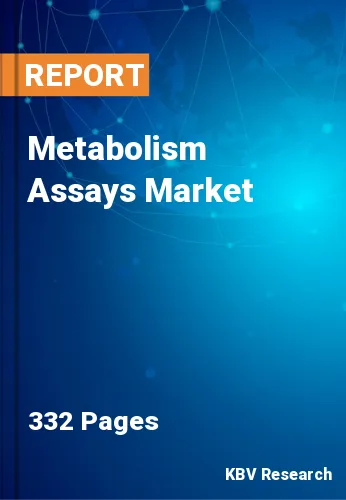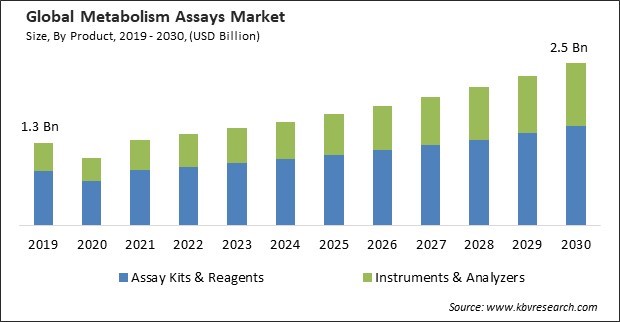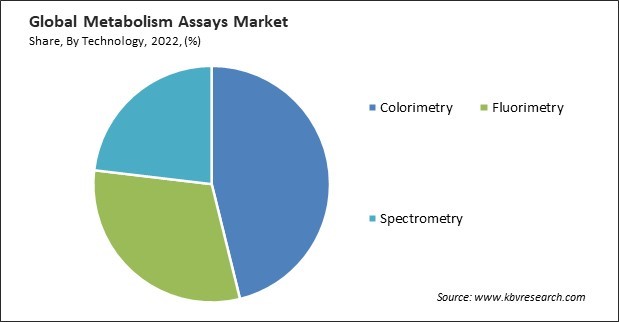
The Global Metabolism Assays Market size is expected to reach $2.5 Billion by 2030, rising at a market growth of 7.7% CAGR during the forecast period.
Spectrometry encompasses a range of methods, including mass spectrometry and nuclear magnetic resonance (NMR) spectroscopy, enabling the quantification and characterization of metabolites, proteins, and enzymes involved in metabolic pathways. Consequently, the Spectrometry segment registered $327.3 Million revenue in the market in 2022. This technology Its high sensitivity and specificity make it an essential tool for both basic research and drug development, aiding in the identification of biomarkers, assessment of metabolic phenotypes, and the evaluation of potential therapeutic compounds. Some of the factors impacting the market are increasing funding and investments in metabolic research, rise in prevalence of chronic diseases and high cost of metabolism assay analyzers.

Increasing funding and investments in metabolic research have played a pivotal role in driving the growth of the market. These are essential tools in metabolic research, and the availability of financial support has enabled advancements in technology, expanded research horizons, and facilitated the development of innovative assays. Funding allows researchers to explore novel avenues of metabolic research. This has led to significant advancements in understanding metabolic pathways, biomarkers, and the molecular mechanisms underlying metabolic disorders. Moreover, Chronic diseases are characterized by long-lasting and often progressive health conditions that can significantly impact a person's quality of life and overall health. Metabolism assays play a crucial role in diagnosing, monitoring, and managing these chronic diseases, making them indispensable tools for healthcare providers and researchers. Diabetes, especially type 2 diabetes, has become increasingly prevalent globally. Metabolism assays, such as glucose testing, HbA1c measurements, and insulin assays, are essential for diabetes diagnosis and monitoring, driving the demand for these assays. As chronic diseases grow, the market is expected to expand further to meet the increasing demand for these essential diagnostic tools.
Additionally, the COVID-19 had a significant impact on the market. Like many other industries, the market experienced disruptions in supply chains due to lockdowns, restrictions on international trade, and transportation challenges. This impacted the availability of assay reagents and equipment. During the initial phases of the pandemic, there was a significant shift in research priorities towards virology and immunology. As healthcare systems adapted to the pandemic, there was an increased focus on telehealth and remote patient monitoring. Metabolism assays related to monitoring and managing chronic conditions remotely gained importance. Companies implemented strategies to ensure resilience in the face of future disruptions. Therefore, the market will grow positively after the pandemic.
However, the cost of acquiring, operating, and maintaining these analyzers can be a barrier for many healthcare providers, laboratories, and research institutions. High upfront costs make investing in metabolism assay analyzers complex for smaller healthcare facilities, clinics, and research labs. This limits access to advanced metabolic testing and diagnostics in certain regions or settings. The cost of purchasing, calibrating, and maintaining assay analyzers strains the budgets of healthcare organizations. This can lead to delays in adopting the latest technologies or replacing outdated equipment. Patients may face high out-of-pocket expenses when using expensive analyzers for metabolic assays. The high cost of analyzers can limit the overall market potential by reducing the number of potential customers and slowing market expansion. Due to the high cost of analyzers, market growth will be hindered.
Based on application, the market is fragmented into diagnostics and research. In 2022, the diagnostics segment held the highest revenue share in the market. Diagnostics applications in the market are crucial for detecting, diagnosing, and monitoring various metabolic disorders and assessing overall metabolic health. These applications encompass various tests and assays that help healthcare providers, clinicians, and researchers gain insights into patients' metabolic profiles. Metabolism assays are widely used in diagnosing and monitoring diabetes mellitus, a condition characterized by abnormal blood glucose levels. They empower healthcare providers and researchers to make informed decisions for better patient care and outcomes.
By technology, the market is categorised into colorimetry, fluorimetry, and spectrometry. The fluorimetry segment recorded a remarkable revenue share in the market in 2022. Fluorimetry technology is a powerful analytical technique used extensively in the market for quantitatively measuring various metabolic parameters and biomolecules. Fluorimetry relies on detecting fluorescence emission from molecules when they absorb and then emit light at specific wavelengths. In metabolism assays, fluorimetry technology finds applications in various assays related to enzyme activity, nucleic acids, and specific metabolites. It is a versatile tool used extensively in metabolic research, drug discovery, and clinical diagnostics within the market.

On the basis of product, the market is segmented into instruments & analyzers and assay kits & reagents. The instruments & analyzers segment acquired a substantial revenue share in the market in 2022. Instruments and analyzers for metabolism assays encompass specialized equipment to measure various metabolic parameters and biomarkers. These tools are essential for conducting metabolic research, diagnosing disorders, and optimizing clinical interventions. Metabolic carts are versatile instruments for measuring respiratory gases (oxygen and carbon dioxide) during metabolic assessments, including VO2 max analysis and RMR measurements.
Based on end user, the market is classified into hospitals, diagnostics laboratories, pharmaceutical & biotechnology companies, and CROs & academic research institutes. In 2022, the hospitals segment witnessed the largest revenue share in the market. Hospitals use metabolism assays to monitor blood glucose levels in diabetic patients. Continuous glucose monitoring and HbA1c assays are examples of metabolism assays that help assess glycemic control and guide insulin therapy adjustments. Hospitals use metabolism assays to assess the nutritional status of patients, measuring essential nutrients such as vitamins, minerals, and trace elements.
| Report Attribute | Details |
|---|---|
| Market size value in 2022 | USD 1.4 Billion |
| Market size forecast in 2030 | USD 2.5 Billion |
| Base Year | 2022 |
| Historical Period | 2019 to 2021 |
| Forecast Period | 2023 to 2030 |
| Revenue Growth Rate | CAGR of 7.7% from 2023 to 2030 |
| Number of Pages | 332 |
| Number of Table | 530 |
| Report coverage | Market Trends, Revenue Estimation and Forecast, Segmentation Analysis, Regional and Country Breakdown, Companies Strategic Developments, Company Profiling |
| Segments covered | Product, Technology, Application, End User, Region |
| Country scope | US, Canada, Mexico, Germany, UK, France, Russia, Spain, Italy, China, Japan, India, South Korea, Singapore, Malaysia, Brazil, Argentina, UAE, Saudi Arabia, South Africa, Nigeria |
| Growth Drivers |
|
| Restraints |
|
Region-wise, the market is segmented into North America, Europe, Asia Pacific, and LAMEA. In 2022, the North America region generated the highest revenue share in the market. The expansion of the market in North America is expected to continue, driven by these factors. As the region's healthcare system evolves, focusing on early diagnosis, disease prevention, and personalized treatment plans will likely further boost the demand for metabolism assays. Additionally, ongoing research and technological innovations will contribute to the market's growth and the development of more accurate and efficient metabolic diagnostic tools.
Free Valuable Insights: The Global Metabolism Assays Market size to reach USD 2.5 Billion by 2030
The market research report covers the analysis of key stake holders of the market. Key companies profiled in the report include Merck KGaA, Thermo Fisher Scientific, Inc., Abcam Plc, Agilent Technologies, Inc, Promega Corporation, Kaneka Eurogentec S.A (Kaneka Corporation), RayBiotech Life, Inc, Sartorius AG, Elabscience Biotechnology Inc. and Bmg Labtech GmbH.
By Product
By Application
By Technology
By End User
By Geography
This Market size is expected to reach $2.5 Billion by 2030.
Increasing funding and investments in metabolic research are driving the Market in coming years, however, High cost of metabolism assay analyzers restraints the growth of the Market.
Merck KGaA, Thermo Fisher Scientific, Inc., Abcam Plc, Agilent Technologies, Inc, Promega Corporation, Kaneka Eurogentec S.A (Kaneka Corporation), RayBiotech Life, Inc, Sartorius AG, Elabscience Biotechnology Inc. and Bmg Labtech GmbH.
The expected CAGR of this Market is 7.7% from 2023 to 2030.
The Assay Kits & Reagents segment is leading the Market by Product in 2022; thereby, achieving a market value of $1.5 billion by 2030.
The North America region dominated the Market by Region in 2022, and would continue to be a dominant market till 2030; thereby, achieving a market value of $899.8 million by 2030.
Our team of dedicated experts can provide you with attractive expansion opportunities for your business.
